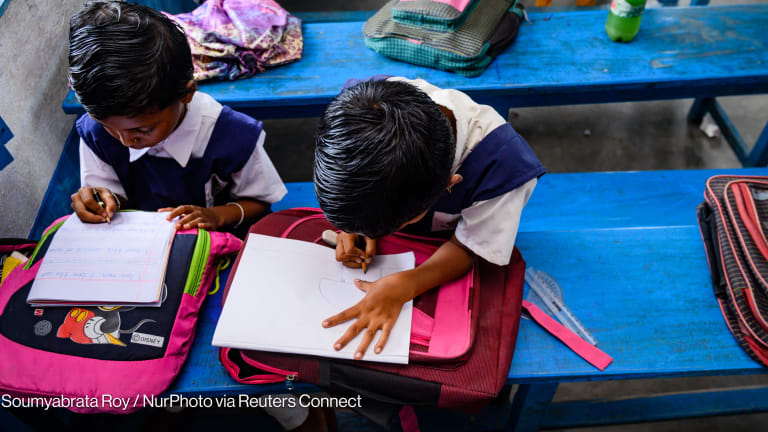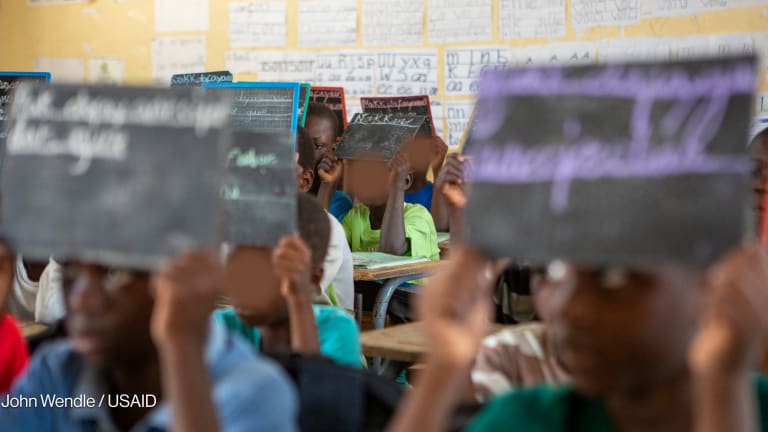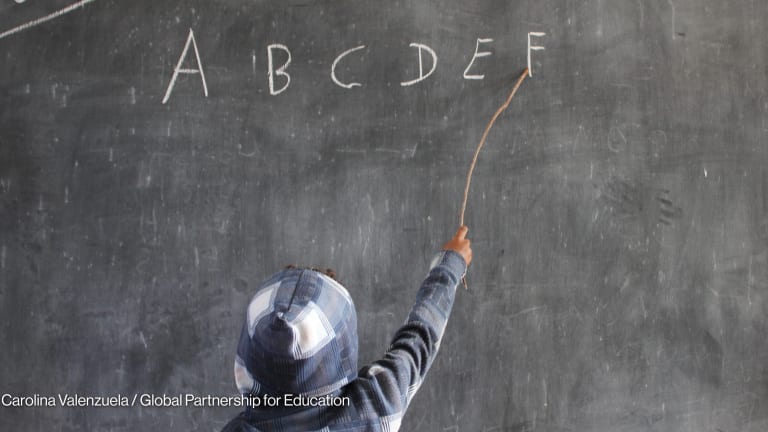
KATHMANDU, Nepal — The cash-strapped global education sector has a new donor — the world’s largest mining company, BHP Billiton — which has pledged $52 million to help improve access and learning outcomes for the poorest.
Earlier this year, the Australian mining giant’s foundation announced a string of education grants under its “Education Equity” strategy designed to improve access to quality education for the most disadvantaged while also “using the transformative power of evidence-based innovation to disrupt current trends driving disparity of education outcomes,” it claimed.
More on education:
► Teach For All looks beyond the classroom with new community lab
► Is the global education sector heading toward fragmentation?
► International Finance Facility for Education musters growing support
In BHP Foundation’s first foray into education, it is allotting $52 million over five years from its approximately $190 million pot. Its first education grantees are Teach For All, the Brookings Institution, UN Women, and the Education Endowment Foundation. The charity, which was launched in 2013, also works on natural resource governance and environmental resilience.
Devex sat down with the foundation’s CEO James Ensor and education lead Brodie Vansleve in Nepal during Teach For All’s annual conference to find out more about the strategy.
A ‘deliberate’ strategy for effectiveness
According to Ensor, his team was “very deliberate” about how it went about deciding which development projects to support after being given a “clean sheet of paper” by BHP’s board. The process took two years and involved consultations with a wide group of experts.
“We wanted to make a difference at scale globally, and so one of the first decisions we took was to recognize that we are not subject-matter experts … so we reached out to experts … to co-create our strategies … and determine what are the needs ... [and] gaps and emerging issues where there isn’t significant investment and focus,” Ensor said.
Around the time the foundation was conducting its deliberative process, the Education Commission released its landmark 2015 report pointing to massive underinvestment in education, estimating funding would need to increase nearly threefold to $3 trillion by 2030 across all low- and middle-income countries in order to meet the Sustainable Development Goals for education.
Within this context, Ensor said global education emerged atop the list for funding but said it also became clear that “more money” was not the only solution.
“The headline is always education needs more money … and I’m not dismissing that but … one real gap in the system is systematically working to enhance the effectiveness of current spending ... to enhance outcomes and impact,” he said.
Effectiveness is where the foundation, by virtue of being funded by a multinational company, really adds value to the sector, Vansleve suggested.
“Big organizations like BHP [think] every day about ‘how do you make better decisions,’ [and] ‘how are those decisions based on return on investment or effectiveness’ … but it’s a conversation piece which doesn’t often happen in education … that question [about effectiveness] is not at front and center,” she said.
In June and July, the foundation announced its first four major education grants, centered around enhancing the impact and effectiveness of current spending by policymakers and implementers.
The grants include $14.8 million to Teach For All to support its education leadership development work, especially a new Community Impact Lab, announced in Nepal, which is intended to accelerate community-led approaches to learning.
British education charity the Education Endowment Foundation received a five-year £9.8 million ($12.7 million) grant to scale up its work on building a global evidence ecosystem for teaching which looks for “high-potential approaches and programmes” to support teachers.
The foundation is also working with the United Nations through UN Women on a program to help get young women who have missed out or dropped out of school back into the classroom or into vocational training, known as the “Second Chance Education Programme.” The funds will support the program in Chile, Mexico, India, Jordan, Cameroon, and Australia with $15.56 million for an initial three years.
BHP Foundation has also granted $8 million over five years to Washington-based think tank the Brookings Institution for the Center for Universal Education, which will identify, analyze, and help decision-makers scale up effective and evidence-based education innovations
Fostering collaboration
The foundation may explore additional projects, but the main focus for the coming years will be supporting existing grantees with their individual projects while fostering broader collaboration across the global education sector, Vansleve said.
“An important aspect of the ... strategy is using the foundation’s voice, the voice of our partners, and the voice of the collective effort to advance learning outcomes across the world,” Vansleve explained, adding that this includes working to “support and create an environment that fosters collaboration and collective action.”
While BHP Foundation certainly represents a major new donor in the global education space, Ensor is keen to make sure the charity doesn’t contribute to what some experts have described as fragmentation and duplication within the sector amidst the recent emergence of a number of new funds and financing instruments.
“We are acutely aware that there are a large number of actors in the global education landscape and so we didn’t want to contribute in any way to fragmentation,” he said.








